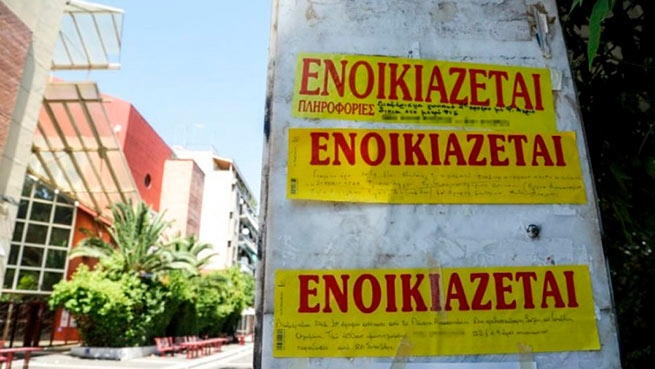Rent growth continue this year, which will make the cost of housing inaccessible for low-income households and youth.
Rapidly changing economic conditions have made it difficult to rent decent housing in Attica and Thessaloniki. After two years (2021-2022) in which apartment rents have skyrocketed, real estate market professionals are predicting that price increases will continue this year as well, and the only hope for those looking for a rental home is that the scenarios they say will be less aggressive compared to last year.
Growth from 2% to 5%
Barring further shocks, average home rents are expected to rise by 2-5% this year, mainly due to a steady increase in demand, ongoing inflation, a lower value of money, more expensive building materials and upcoming auctions.
According to market operators, it is likely that in some areas, such as the center of Piraeus and Thessaloniki, growth will be above 5%.
It is also predicted that housing rents will continue to rise in areas near metro stations, trains and tram lines. At the moment, the cheapest apartment in Athens has to pay a rent of more than 6 euros per sq.m. per month, while in Thessaloniki the price is slightly lower – 5.7 euros per sq.m. per month.
Even in so-called “popular” areas like Ampelokipi or Kalithea, renting a 20-year-old apartment of 80 sq.m., with two bedrooms and one bathroom, is at least 740 and 670 euros respectively, according to data compiled by classifieds site Spitogatos. You can find a small apartment for 1-2 people below 300 euros only in the basement, and these apartments are selling like hot cakes.
Comparison
The inability of most SMEs to cover this level of rent is also evident from the comparison of income and rent growth. In Greece, the average salary in 2022 was 1176.5 euros against 1117 euros in 2021, according to the information system ERGANI, recording an increase of 5.3%, which is well below inflation. Over the same period, supply prices in the rental market increased by 6.7% across the territory.
Why are they growing?
If wages have risen marginally, while energy and food prices have risen sharply, why are rents rising? The reason is the increased demand and the decreasing number of proposals to which the real estate market reacts.
The share of rental homes has increased dramatically in recent years, from 15.4% in 2005 to over 26% today, while the number of new rental homes has been declining due to a number of factors, including a decline in construction activity over the years economic crisis, the depreciation of the existing construction potential and the concentration of a significant number of real estate objects in the hands of various funds (mainly international ones), which exclude objects from real estate turnover, thus increasing its deficit.
A significant role in the shortage of residential real estate was also played by a sharp increase in short-term rental objects. For many property owners, it is often much more profitable to rent out their properties on a short-term lease than on a long-term one. Despite numerous statements from the authorities, the law, which would regulated this point was never accepted.
European Champions
And all this despite the fact that Greece is the “champion” of Europe in terms of excessive burden on households in terms of the cost of housing compared to their income. According to the latest data from Eurostat, every third household in the major cities of our country (32.4% coefficient) had to pay more than 40% of their income for housing expenses. This is followed by the urban areas of Denmark (21.9%) and the Netherlands (15.3%). It is noted that this indicator was formed in 2021 at the level of 10.4% of the population. EU in cities.
Mortgage, rent, or utility bills are in arrears, another sign that the cost of a home may be too high. In 2021, our country also led this index, as 36.4% of Greeks, much higher than the European average, lived in households that could not service mortgage, rental or DEKO accounts.
Inequality
In fact, despite the decline from the all-time high of 2015, when one in two Greeks were in debt on loans, rent and bills, the rate of contraction is lower than in other European states, as a result of which the “scissors” of inequality are widening.
Evidence of the inaccessibility of housing is the percentage of young people who, although they have completed their studies (age 25-34), still live with their parents. Greece ranks second in the EU out of 27 for this indicator, with 6 out of 10 young people (60.7%) living in their home country. Since 2018, when rents began to rise, this figure has increased by 3.2%.







More Stories
The e-katanalotis platform is up and running. How to use it
Eurostat: inflation in Greece and the eurozone
How banks will work on holidays leading up to Easter